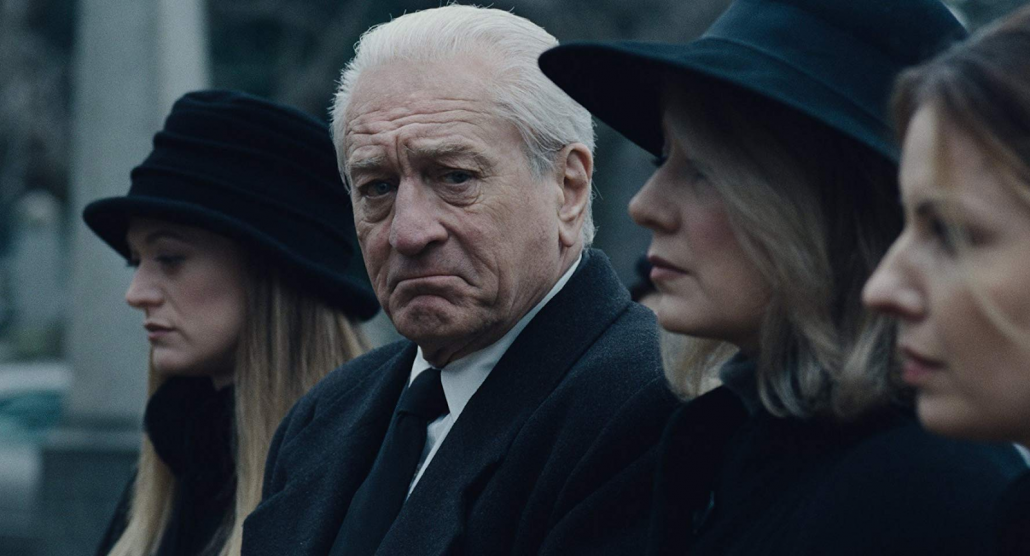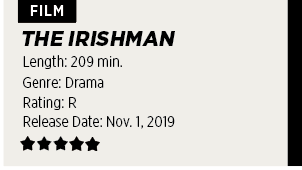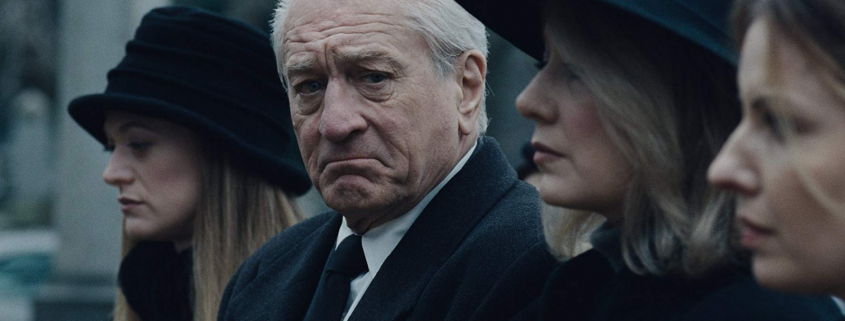REVIEW: ‘The Irishman’ is a contemplative, somber masterpiece

Martin Scorsese’s previous mobster epics — “Goodfellas,” “Casino,” “Mean Streets” — all depict their characters in the prime of their gangster life. They enjoy bloody steak dinners at nightclubs with their mistresses and killing off wiseguys who said the wrong thing at the wrong time. The gangster life exalted power, wealth and kinship.
“The Irishman,” however, quickly subverts that approach. From its opening scene, we see a fragile, wheelchair-stricken Robert De Niro reminiscing on his life, already long past his mafia days. He’s been left all alone, reaching the end of his life with no one by his side.
Scorcese isn’t just portraying the life of truck-driver-turned-hitman Frank Sheeran (De Niro) — he’s much more interested in how Sheeran reflects on his life, the mistakes, friendships and guilt that resulted from his time in the Mafia. What happens with all the guilt that has built up? What happens when everyone around you is gone, either by gruesome death or from active disacknowledgement? Were the successes in life worth all the bloodshed and family negligence? These are questions that linger in Sheeran’s mind as he nears the end.
This film can also be seen as Scorsese dealing with his own mortality, asking the same questions of success, love, friendship and legacy. Nearing 80 years old, Scorsese strays away from the frantic, cocaine-induced pace seen in “Goodfellas” for an introspective look at aging and the legacy that a mobster leaves behind, one riddled with violence and betrayal.
Sheeran, a World War II veteran, begins his mobster career working for Russell Bufalino (Joe Pesci), leader of the Bufalino crime family in Philadelphia. Sheeran quickly becomes known as the man “who paints houses” with streaks of blood from the men he was ordered to kill. As he moves up in rank, he begins to work for Jimmy Hoffa (Al Pacino), who heads the Teamsters, the largest union in the nation at the time, but thrives off his deep affiliations with the mafia. What starts off as working relationship between Sheeran and Hoffa quickly blossoms into a strong friendship.
The emotional crux of the film relies on Sheeran’s relationship with both Russell and Hoffa, men he respects greatly. The chemistry between Pacino, De Niro and Pesci is undeniable in this film; they capture a true sense of friendship and respect for one another.
De Niro excels at bottling up all of his violent tendencies: One moment he’s cracking jokes and the next he’s cracking skulls. This is a man who does what he needs to do, plays it straight and doesn’t talk back. Pesci’s performance might be the most surprising, as he plays an intimidating yet tempered mafia boss. When you think of Pesci, you think of the loudmouth, short-fused, easily insulted characters he plays in “Goodfellas” and “Casino.” This performance requires that he stay reserved; he’s a man that understands that the hardest things in life require passivity. That’s just the way it works when you’re a gangster.
“The Irishman” may be one of Scorsese’s most contemplative films, but it still carries plenty moments of comedic relief, most of which come from Pacino. Relying on his usual boisterous yells and exaggerated hand gestures, Pacino manages to steal the movie as a short-tempered man who demands others show him respect and common courtesy — especially when it comes to being on time for meetings.
Hoffa’s shouting and petty nature is juxtaposed against Sheeran’s tendency to be reserved and stand in the background as everything unfolds. While it may seem that they will not be able to stand each other, both begin to grow comfortable and voice their frustrations with each other.
Friendships are forged, but friendships don’t last in this world. One night you could be out eating with your family, and the next thing you know, a pistol is pressed against your head.
One clear distinction between Bufalino and Hoffa is their relationship with Sheeran’s daughter, Peggy (Anna Paquin). Russell, although reserved, still carries an intimidating presence. Meanwhile, Hoffa has a personality that is hard not to like. Understandably, Peggy gravitates toward Hoffa, who she sees as more of a father figure than her own.
As the years go by and Peggy grows up (now played by Paquin), she remains disconnected from her father. His life has become solely centered around the mafia. His wife and kids are cast aside. She can’t even trust him to protect her because she knows just how far he will go to ensure her safety.
Although Peggy speaks only a few lines in the film, she may be the most important character for the themes that Scorsese is tackling. She observes and silently disapproves of what Sheeran is doing. Through her character, we sense that Frank is a man that has gone too far down a path of criminality and murder. Frank will never be able to reconcile the fact that he neglected his own family.
All these themes make “The Irishman” a wonderfully rich text; the film earns every second of its almost three-and-a-half-hour runtime with mesmerizing performances from three of the greatest actors of all time and impeccable, precise direction from arguably the greatest director of all time. Steve Zaillian (“Schindler’s List”) delivers a script that meshes comedic banter with honest discussions on loyalty, guilt and consequences.
Scorsese has delivered another masterpiece, one that is content with being mournful rather than celebratory. It is epic in scope, but personal in the themes it’s trying to relay. We will all meet our inevitable fates, but Scorsese asks us: How do we reckon with our mistakes as time continues to pass by?


